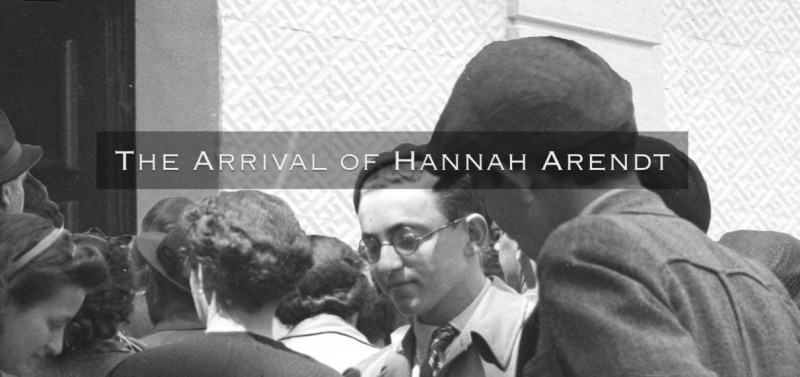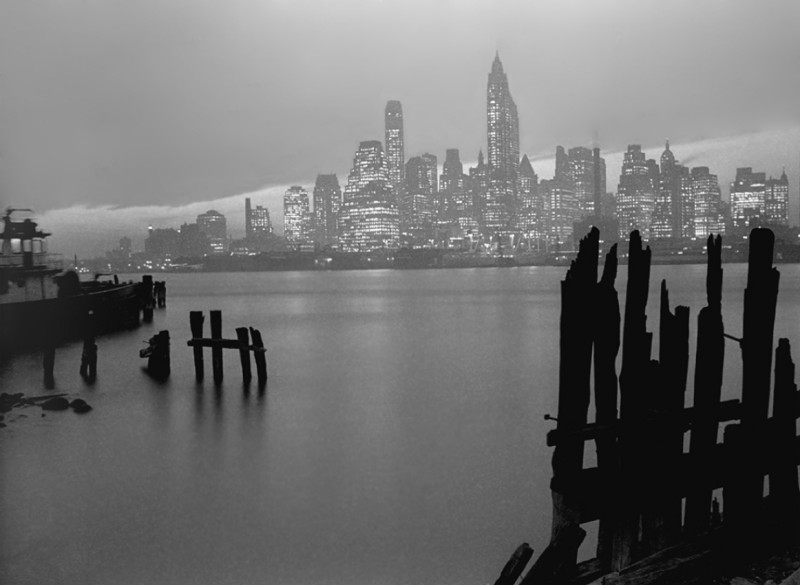
The Arrival of Hannah Arendt
This film describes the arrival of Hannah Arendt - a Jewish, German-American political theorist and publicist - in New York and her reflections on flight and helping people start over.

Neue Heimat? Ob es das wohl gibt, fragte ich mich zögernd, und ich konnte mir selbst keine Antwort geben. Plötzlich, an einem frühen Morgen stürzte mein Junge zu mir in die Kabine –
„Mutti, Mutti, komm’ schnell, man sieht die ersten Lichter von New York.” Widerwillig ließ ich mich an Deck schleppen – ich teilte nicht die freudige Erregung der übrigen Passagiere – aber ich sah Licht, schimmernde Lichter durch die frühe Morgendämmerung. Lichtschein aus den Wolkenkratzern New Yorks, die sich gigantisch, gespenstisch vom Horizont abhoben. Mechanisch schlug ich es auf und schrieb, oder besser kritzelte, am schwankenden Tisch den 22. Februar 1940, auf hoher See: „Die ersten Lichter von New York winken mir am frühen Morgen willkommen. Eine leise Hoffnung erfüllt mein Herz. Gott, gib mir Liebe und Kraft, um mir und den meinen eine neue Heimat zu verdienen, ihr dienend mit Liebe und Treue so wie ich stets der alten gedient…”
Zuerst nun: Zollkontrolle, unsere kleinen Köfferchen waren schnell durchgesehen – wir durften ja nur das Nötigste mitnehmen – allerdings, das schwarze Papier, das ich zum Schutz über unsere Sachen gebreitet hatte, schien dem Zollbeamten verdächtig.
…und dann hörten wir die Frage: „Wo wollt Ihr denn jetzt wohnen?” Keiner hatte ein noch so einfaches Zimmer für uns gemietet, für Unterkunft gesorgt, wohl aus Angst, daß sie dieselbe hätten bezahlen müssen!
Wir mußten annehmen, denn wir hatten ja kein Geld, um in einem Hotel auch nur für ein paar Tage Unterkunft zu suchen, so waren wir zumindest zwei Tage und Nächte „geborgen” und danach, so dachte ich, würde ich schon irgendwie Arbeit finden, so daß wir ein möbliertes Zimmer würden bezahlen können. So trennte das neue Land uns schon in den ersten Stunden unserer Ankunft, welch ein trauriges Omen.

New home? I wondered hesitantly if there was such a thing, and I couldn’t give myself an answer. Suddenly, early one morning, my boy rushed to me in the cabin –
“Mommie, Mommie, come quick, you can see the first lights of New York.” Reluctantly, I allowed myself to be dragged on deck – I did not share the joyful excitement of the other passengers – but I saw light, shimmering lights through the early dawn.
Light shone from the skyscrapers of New York, which stood out gigantic, ghostly from the horizon. Mechanically I opened it and wrote, or rather scribbled, on the swaying table the 22nd February 1940, on the high seas:
“The first lights of New York beckon me welcome in the early morning. A faint hope fills my heart. God, give me love and strength to earn a new home for myself and mine, serving it with love and faithfulness as I always served the old one…”
First now: customs control, our small suitcases were looked through fast – we were allowed to take only the most necessary things – however, the black paper, which I had spread to the protection over our things, seemed suspicious to the customs official.
…and then we heard the question, “Where are you going to live now?” No one had rented a room for us, no matter how simple, had provided accommodation, probably for fear that they would have had to pay for it!
We had to accept, because we had no money to look for accommodation in a hotel even for a few days, so we were “safe” at least for two days and nights and after that, I thought, I would somehow find work so that we could pay for a furnished room. So the new country separated us already in the first hours of our arrival, what a sad omen.
Hertha Nathorff, née Einstein (1895-1993) was a German pediatrician, psychotherapist and social worker, she published several works, including a book of poems. She was born in Laupheim (Baden-Württemberg) into a Jewish family. She was related to the physicist Albert Einstein, the musicologist and music critic Alfred Einstein, and the film producer Carl Laemmle. Nathorff attended high school in Ulm and, interrupted by a temporary job as a nurse during World War I, studied medicine in Munich, Heidelberg, Freiburg (Breisgau) and Berlin from 1914. After receiving her doctorate degree in Heidelberg (1920) and years as an assistant in Freiburg, she was a senior physician at the Red Cross Women’s and Children’s Home in Berlin-Lichtenberg from 1923-28, then worked in private practice and simultaneously at the Charlottenburg Hospital as head of the family and marriage counseling center. In the course of National Socialist racial policies, she lost her medical license in the fall of 1938, while her husband, formerly a senior hospital doctor in Berlin-Moabit, was granted a license for exclusively Jewish patients. During this period she worked as his receptionist.
Threatened with death in Nazi Germany, she organized emigration with the help of American relatives from November 1938, sending her 14-year-old son ahead to England on a Kindertransport. In April 1939 the couple managed to leave the country for London, and in early 1940 they continued their journey to New York. In New York she worked as a nurse, maid, bar pianist and kitchen help to support the family. She remained a physician’s assistant in her husband’s practice, which opened in 1942 – she did not have the time to get her degree recognized.
Hertha Nathorff took a very active part in the social life of the German-speaking exile community: she organized courses for emigrants in nursing and infant care and cultural events, was the founder of the Open House for the elderly, chairwoman of the women’s group, and an honorary member of the presidium of the New World Club. In the excerpts from the diary of Hertha Nathorff Berlin-New York Aufzeichnungen 1933 bis 1945, which we show in our archive, the author deals with her initial problems, disappointments and mortifications in the New World. She reports on the everyday life of emigrants, on the struggle for existence, on poverty and mental destruction. Despite her longing for the places of her childhood and youth, she never visited Germany again. She never really settled in America. The homesickness remained constant.
Excerpt from the diary of Hertha Nathorff, edited and introduced by Wolfgang Benz (1987): Das Tagebuch der Hertha Nathorff. Berlin – New York. Aufzeichnungen 1933 bis 1945. Schriftenreihe der Vierteljahrshefte für Zeitgeschichte, Band 54. R. Oldenbourg Verlag München, pp. 105, 165.
Translation from German to English © Minor Kontor / We Refugees Archive.